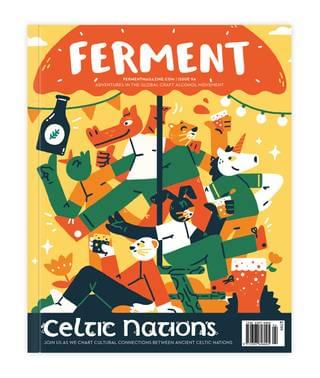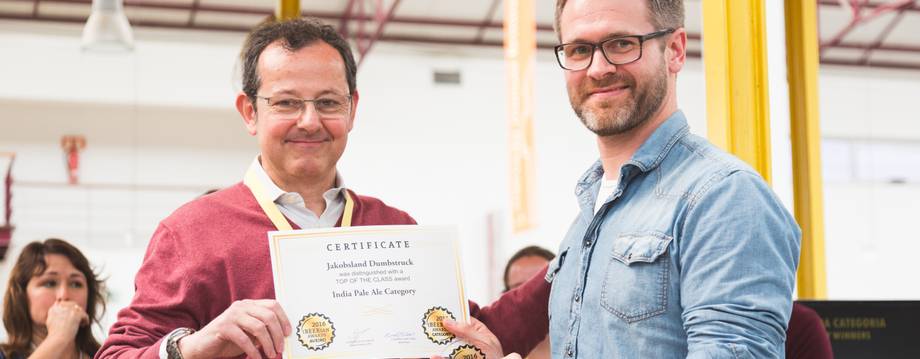Braving waves, for strange shores
Behind every beer by Galicia-based Jakobsland is a personal history, a shared journey, and the feeling of being an outsider
Robyn Gilmour
Photos:
Jakobsland Brewers
Saturday 29 July 2023

This article is from
Celtic Nations
issue 94
Share this article
With Celtic history, at its essence, being a story about the movement of people and the exchange of their ideas, it feels fitting to speak to Galicia-based Jakobsland, a brewery as nomadic as its name suggests. Santiago de Compostela was never locally referred to as Jakobsland, but the surrounding region was called that by Vikings who invaded in the 11th century. Owner Henlo Matthee Swart assures me that his intention in naming the brewery wasn’t to invoke the violence of invasion – after all, Galicians ultimately celebrate the Viking influence in their history – but lean into the bittersweetness of “being from outside”.
Henlo is from many places, and takes something of everywhere he’s lived to the next place he settles, but he started out life in South Africa, only leaving the country in his early 20s to pursue opportunity in the US. He stayed there for two years, working in ski resorts where he was introduced to craft beer as a currency for trading favours, borrowing skis, or swapping for food at the restaurant next door. But he came to think of craft as an exclusively American phenomenon, given that when he moved from the US to UK in the early 2000s, beer was room temperature, gently carbonated, served through old hand pumps, and had a low enough ABV that office workers could drink multiple pints of it on their Friday lunch break before returning to the office.
Differences like these informed how Henlo thought both about beer and about identity; everything a place or population did also emphasised what they didn’t do. By embracing the differences between cultures, beliefs and attitudes, he learned to celebrate, critique, and be changed by them. “Later on, we wrote into our vision for Jakobsland that we wanted to portray all our histories and travels in the beers we made,” says Henlo. “We wanted to stylise that vision into something cooperative, so the passion and the dream never got polished into something very linear.”

During the ten years Henlo was in London, work took him back and forth between the UK and China, and he continued to travel for leisure around Europe, whenever time allowed. After visiting France, Italy, Germany, and the Netherlands, he decided to explore Galicia, and immediately recognised it as a beautiful place, with amazing culture and a pace that was completely different to London’s. For all this, what made him stay was meeting his wife, and later starting a family.
But moving to Galicia meant swapping his status as a visitor for that of a resident foreigner; Henlo never says he felt excluded, but the unintended consequence of how society in Galicia operated meant that not having history in the area made it difficult to integrate into life there.
Henlo struggled to find a job. Employers didn’t recognise his qualifications or experience, and most jobs that weren’t in the civil service were in small family-run businesses; a tough circle to break into when you’ve no family in the region. But for all that, Henlo could also appreciate and admire the deep cultural knowledge that was carried through industry in the region. Where he initially thought of these businesses as so small as to not allow for professional growth and development, he later learned about the ancient, artisanal methods at the centre of what many businesses did. He gives the example of tinned fish, one of Galicia’s many delicacies, and tells me that the method of preservation is incredibly advanced and innovative, in spite of requiring pretty basic materials in the process.
While Henlo chipped away at gaining acceptance in Galician society, he trained to become an English teacher, and taught it locally, as a foreign language. It was in a classroom setting that he met Fran Vaquero Rodriguez, Henlo’s soon-to-be best friend, and future co-founder of Jakobsland. Fran was Spanish, but not from Galicia, so in a lot of ways, he and Henlo both felt like outsiders in the region. They bonded over beer and mountain biking, and before long, Henlo was spending New Years and Christmases with Fran and his family.

“We started doing little courses in microbiology, just to find out what is going on,” says Henlo. “We weren’t trying to brew in any one tradition where the recipe was passed down for hundreds of years to produce very specific styles of beer. I didn’t have the knowledge that comes from brewing for 40 or 50 years, so I had to ask myself ‘ok, where can I get my knowledge from?’ and so learning more about the science behind beer became my way to strengthen myself, as a brewer.”
In the same way, Henlo wasn’t interested in portraying himself as the carrier of a torch for any particular styles or traditions in beer; he didn’t feel it was authentic for him to try and completely blend into Galician life.
“Being from the outside, I didn't want to pretend that I was from this Celtic culture, and just blend in, and get lost among everyone else, because then you’re not being original,” says Henlo. “Fran, Jeremiah [Fox] and I – Jeremiah being our third founding partner – weren’t from Galicia, so we felt like Vikings coming from abroad in their little boats, crossing the ocean and getting to new shorelines. We all had to fight to be here, and then adapt to what new life is like.”
But life, being as unfair and complicated as it is, means having to adapt to loss, and leaving, as much as it requires participants to work at finding meaning and belonging. In February of last year, Fran was killed in a ski accident. Henlo was devastated, but says he “remember[s] him as the most upbeat, uplifting person, and one of the best people I've met in my life. So that's why I still continue with this. Wherever he is, I know he’d want us all to smile, and continue, and enjoy life.”
Without Fran and Jeremiah, who had to move back to the US for family reasons, Henlo is glad things never worked out with buying a brewery of their own; he says he wouldn’t have been able to manage it by himself. Instead, Jakobsland maintains its great relationship with Madrid based brewery, Arriaca, where all its beers are contract brewed. Who knows what the future holds for this Galician brewery, but in the meantime, it continues to work on making great beer, for and by outsiders.
Share this article

